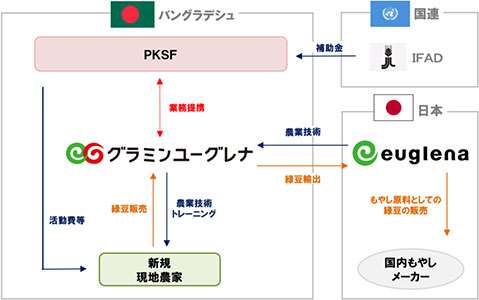バングラデシュでの緑豆事業に熱い想いを持ち、
ユーグレナ社の仲間に
2014年のとある日。
「どんな状況にあっても、バングラデシュでの緑豆事業だけは止めるわけにはいかない…」
佐竹は、バングラデシュの中でも貧困層が多いといわれる農民の所得向上や生活改善を目指すソーシャルビジネスとして、ムハマド・ユヌス博士(2006年ノーベル平和賞受賞)ら率いるグラミングループと共同で、もやしの原料となる緑豆(りょくとう)栽培の会社を2011年に立ち上げたが、その事業が存続の危機に立たされていた。当時の親会社が同事業から撤退する可能性が出てきたのだ。
日本とバングラデシュでこれまで一緒に汗水を流して事業を進めてきた仲間たち、バングラデシュの人たちのキラキラした笑顔、ユヌス氏と交わした約束…。
「ここで止めるわけにはいかない」と佐竹が協力を求めて訪れたのが、ユーグレナGENKIプログラムを推進していたユーグレナ社の社長・出雲だった。
「出雲さん、私たちはこれまでバングラデシュの貧困問題を解決するために緑豆事業に取り組んできました。バングラデシュの子どもたちの栄養問題を解決しようと活動する御社だからこそお願いします。私たちを仲間に入れてくれませんか…?」
「もちろんです。一緒に頑張りましょう!」
2014年10月、佐竹は緑豆事業を支えてきた仲間全員とともに、ユーグレナ社の仲間となった。そして、ユーグレナGENKIプログラムも推進することになった。

2015年5月当時の写真(左から佐竹、出雲、ユヌス氏)
バングラデシュの政府機関(PKSF)との
業務締結で緑豆事業が拡大
佐竹たちは、新たにユーグレナ社とグラミングループとの合弁会社「グラミンユーグレナ」として活動を再開。順調に事業を進めていた矢先、ユーグレナ社にこんな連絡があった。
「国連の一機関であるIFAD(国際農業開発基金)は、農業支援を通じて世界の貧困問題を解決することを目的としています。緑豆事業をIFADとともに行いませんか?」
IFADには日本政府より多くの資金が拠出されているが、その資金を実体的に日本企業が活用した例はなく、ビジネスとして途上国で積極的に農業支援を行ってきたグラミンユーグレナに活用先としての白羽の矢が立ったのだ。
その際に先方から出された条件は2つ。
ひとつはIFADがバングラデシュ政府系開発機関PKSF(バングラデシュの農業協同組合)に補助金を提供するので、PKSFとの業務提携の契約を自分たちで結ぶこと。そして、PKSFは約2,000万人の農家ネットワークを保有しているので、その中から緑豆事業に加わる農家を育成し、彼らの収入増に貢献すること。これが彼らからの条件であった。
また、緑豆事業に参加する2016年当時の農家数約3,500人を、今後3年で1万人にまで増やしてほしいという目標を提示された。
早速、佐竹はIFADのローマ本部やダッカ事務所と何度もディスカッションをした後、PKSFとの業務提携に向け本格的に話し合いを進めることになった。

バングラデシュの農家たちと一緒に緑豆収穫後の作業を行う佐竹
ところがバングラデシュは官僚制度が色濃い国。
佐竹は、そのことを事業展開の中で心得てはいたが、PKSFとの契約締結も一筋縄ではいかなかった。
例えば、PKSFのバングラデシュ事務所への訪問を重ね、交渉と調整しながら書き上げた契約書が、先方の人事異動によりゼロから書き直しになり、半年ほど契約締結が延びた。
また、話し合いをするために打ち合わせを調整してからバングラデシュに渡航したが、予定が合わないと言われて現地で長く待たされることもあった。
それでも、「PKSFとの業務提携が緑豆事業の拡大につながり、バングラデシュの貧困農家のサポートの強化になるはず」という想いが、言語や文化の壁で疲弊しそうになる佐竹を突き動かし続けていた。
そして、ついに2016年6月。
佐竹の粘り強い交渉が功を奏し、PKSFと業務提携契約を締結。そしてこの契約締結により、今後緑豆事業を行う農家は約3倍になることとなった。
なお、2018年度は以前からの契約農家を合わせると8,000人が参加する予定であり、2019年度には目標としていた契約農家数10,000人が達成できる見込みである。
佐竹は今日も、バングラデシュの貧困問題を解決するために、精力的に世界を飛び回っている。

2017年11月掲出
euglena Data
~緑豆事業のビジネスモデルについて~
バングラデシュ現地の農家に緑豆栽培ノウハウを教え、現地より高い値段で
グラミンユーグレナ社が買い取り、もやし原料として日本に輸出しメーカーに販売する
※体制は当時のものです

euglena Projects
vol.00
バングラデシュの子どもたちを
救う素材を探せ。
vol.01
誰もなし得ていない、ユーグレナの
屋外大量培養技術を確立せよ。
vol.02
ユーグレナを
300億円市場に育て上げよ。
vol.03
バングラデシュの
全ての小学校に給食を。
vol.04
煙突から排出されるCO2で
ユーグレナを培養せよ。
vol.05
ユーグレナの化粧品事業を
立ち上げよ。
vol.06
日本初のバイオジェット燃料
製造プラントを建設せよ。
vol.07
「ミドリムシ」の名前を
武器にせよ。
vol.08
中国にユーグレナを
普及せよ。
vol.09
スーパーユーグレナを
獲得せよ。
vol.10
バングラデシュの
貧困問題を
緑豆事業で解決せよ。
vol.11
ユーグレナでタケダと
新商品を開発せよ。
vol.12
下水処理場の下水を活用し、
ユーグレナを培養せよ。
vol.13
ユーグレナの仲間の
「行動指針」を作成せよ。
vol.14
日本独自の技術で、
ユーグレナを培養せよ。
vol.15
仲間がより働きやすい
オフィスを追求せよ。
vol.16
ゆーぐりん保育園を
オフィスに併設せよ。
vol.17
ユーグレナで石垣島の
地域活性化に貢献せよ。
vol.18
ユーグレナの認知度を上げる
新商品を共同開発せよ
vol.19
ユーグレナのカフェを
石垣島で開店せよ。
vol.20
ユーグレナを飼料にして
比内地鶏を育成せよ。
vol.21
ユーグレナ入りディーゼル燃料を
いすゞ自動車と共同で実用化せよ。
vol.22
ユーグレナを使った
バイオ燃料を生産せよ。
vol.23
研究系ベンチャーを
ヒト、モノ、カネで支える
新しいファンドを確立せよ。
©2018 MELTIN MMI
vol.24
ユーグレナとクロレラで世界初の
ASC-MSC藻類認証を取得せよ。
vol.25
グループ企業との
シナジーを構築せよ。
vol.26
新しい仲間と、
遺伝子レベルで人を健康にせよ。
vol.27
自由が丘と
ユーグレナを普及せよ。
vol.28
ユーグレナサプリメントの
加工工場を立ち上げよ。
vol.29
理科のチカラで石垣島の
地域活性に貢献せよ。
vol.30
新しいユーグレナの
基幹化粧品を開発せよ。
vol.31
ロヒンギャ難民の
食料問題解決に貢献せよ。
vol.32
ユーグレナ由来の美容成分を
研究解明せよ。
vol.33
学生のチャレンジを応援!
通年採用を開始せよ。
vol.34
ユーグレナとクロレラで
ハラール認証を取得せよ。
vol.35
健康寿命を伸ばすユーグレナの
可能性を発見せよ。
vol.36
竹富島のクルマエビ養殖事業を
発展させよ。
vol.37
「G20軽井沢」にてユーグレナバイオディーゼル燃料で自動車を走らせよ。
vol.38
石垣島ユーグレナの魅力を伝えるキャラクターを企画せよ。
vol.39
CFO(最高未来責任者)を募集・選考せよ。
vol.40
国産カラハリスイカを
栽培せよ。
vol.41
日本初となる「バーチャルオンリー
株主総会」を開催せよ。
vol.42
次世代バイオディーゼル燃料を
普及させよ。
vol.43
コーポレート・
アイデンティティを刷新せよ。
vol.44
石垣島生まれの
ユーグレナを浸透させよ。
vol.45
ユーグレナ由来の
肥料研究を加速させよ。
vol.46
日本の空をバイオ燃料で
クリーンにせよ。
vol.47
オフィス環境を改善し、
仲間の生産性を向上させよ。
vol.48
化粧品における
サステナビリティを追求せよ
vol.49
次の新素材「ミドリ麹」の
価値を世に拡げよ。
vol.50
ユーグレナの
ESG経営を加速させよ
vol.51
未来世代アドバイザリーボードを
設置せよ。
